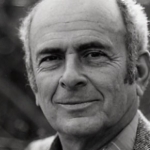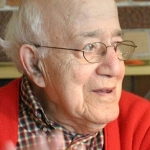I stood alone in a deserted square.
The night was trembling with a violet
Expectancy. At the far edge it moved
And rumbled; on that flickering horizon
The guns were pumping color in the sky.
There was the Front. But I was lonely here,
Left behind, abandoned by the army.
The empty city and the empty square
Was my inhabitation, my unrest.
The helmet with its vestige of a crest,
The rifle in my hands, long out of date,
The belt I wore, the trailing overcoat
And hobnail boots, were those of a poilu.
I was the man, as awkward as a bear.
Over the rooftops where cathedrals loomed
In speaking majesty, two aeroplanes
Forlorn as birds, appeared. Then growing large,
The German Taube and the Nieuport Scout,
They chased each other tumbling through the sky,
Till one streamed down on fire to the earth.
These wars have been so great, they are forgotten
Like the Egyptian dynasts. My confrere
In whose thick boots I stood, were you amazed
To wander through my brain four decades later
As I have wandered in a dream through yours?
The violence of waking life disrupts
The order of our death. Strange dreams occur,
For dreams are licensed as they never were.



















Comment form: